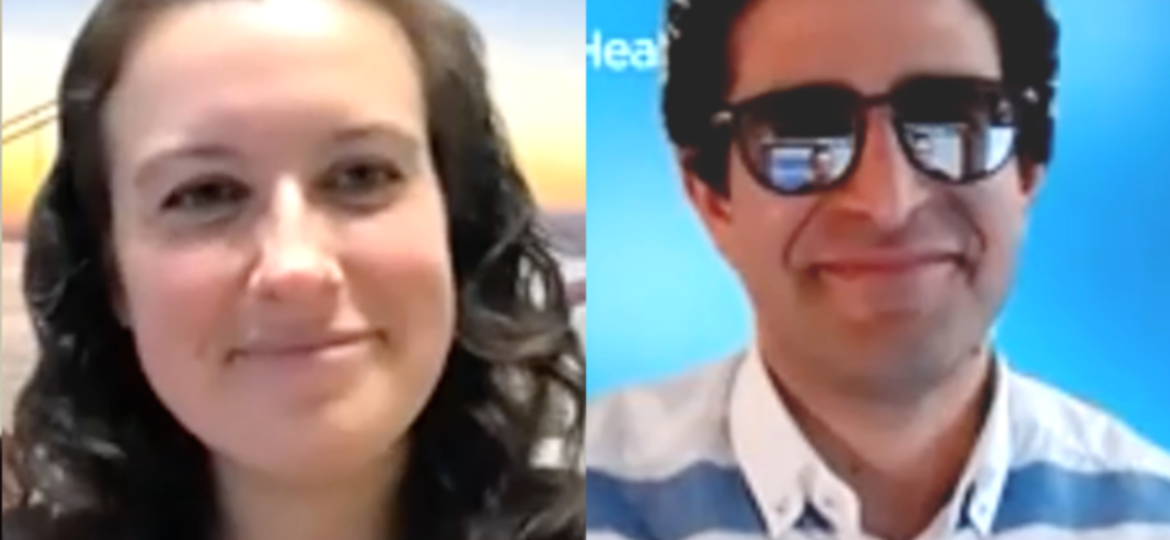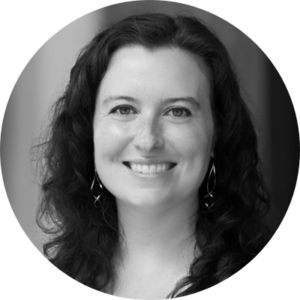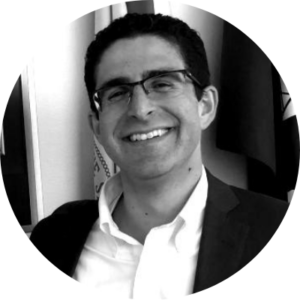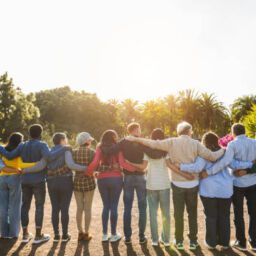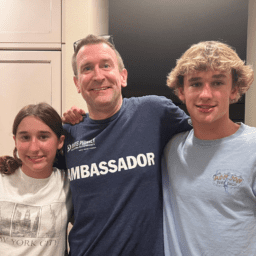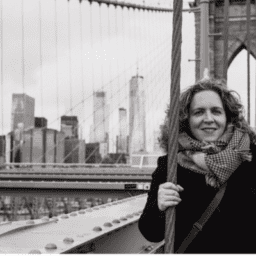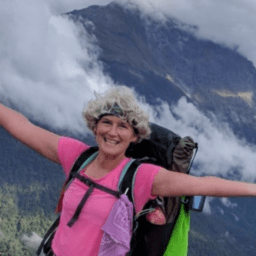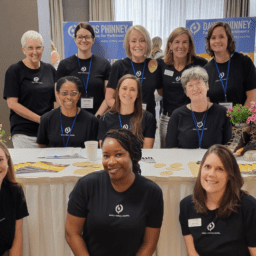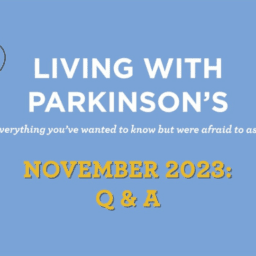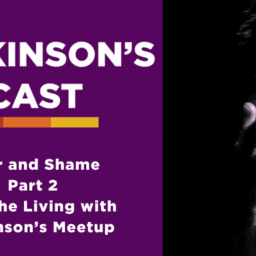Living well with Parkinson’s takes support – from our families, communities, healthcare professionals, workplaces, government, and more. When those systems are compromised due to systemic oppression, bias, or lack of inclusion, health outcomes are compromised. In this webinar, Wissam Deeb, MD, and Nicole Rosendale, MD, help us understand how issues faced by the LGBTQ+ community show up in Parkinson’s care and how we can increase awareness and create more inclusive spaces to address inequities.
You can watch the video below.
To download the audio, click here.
You can read the transcript below. To download the transcript, click here.
Note: This is not a flawless word-for-word transcript, but it’s close.
Jenna Deidel (Director of Programs and Outreach, Davis Phinney Foundation):
Welcome everybody to today’s webinar, health disparities and Parkinson’s with a focus on the LGBTQ+ community. I’m Jenna Deidel, I’m our director of programs and outreach here at the Davis Phinney Foundation and I’m really pleased to be welcoming some folks today to discuss this really important topic. So, before we dive right in, I want to do a little bit of housekeeping. So, for those of you who are maybe unfamiliar with this webinar format, the best way to interact with us is to use your chat. So, if you go down at the bottom of the screen, you’ll see the word chat as well as a little talk bubble. And that’s a great way for you to right now, let us know that you are here and hearing us or not. If you’re having any technical issues and we’re not coming through loud and clear, feel free to chat a message to us to share where you’re from, who you are why you’re joining today, all of that and throughout please drop questions in there.
We will have an hour webinar today. About 40 minutes will be kind of a conversation between the three of us, but then, you know, we’ll leave time at the end to answer questions that come up in the chat or that even come up for us as we talk together. So, a very organic kind of style to our time today. Similarly, we also are offering closed caption today. So, you can, you should be able to go down at the bottom of your screen and see live transcript. And in there you can turn on or off those the closed captioning as well as make them larger or smaller. So, you should have controls there to be able to do all of that good stuff. If for any reason you get disconnected or you have to step away from today’s conversation, please know that we’ll share a recording afterwards, as well as a transcript and an audio version if you’d like to listen to us while you go on a walk outside, maybe that’s what I like to do a lot with our webinars.
And I think that that should kind of take care of the, the, the nuts and bolts of what we need today. If you ever need us though, hop into that chat and we’ll be right there. So, let’s dive right in to get us started. We have two really wonderful experts today who I’ve gotten to know a little bit through putting together this webinar and who are going to share with us some insights about how issues of bias and systemic oppression, and more than that, all the nuances of that, affect members of our community who are LGBTQ+.
So, the structure of today’s conversation, we’ll start somewhat big picture thinking even a little bit historically around, you know, kind of healthcare and the LGBTQ+ community. And then we’ll start to kind of drill down more to understand what does this look like today? How does this show up for people living with Parkinson’s? And also, for all of us that are listening today, what might we do as individuals or as leaders of organizations or support groups or anything like that to start to create more inclusive communities. And so, with us today are Dr. Nicole Rosendale, who is an assistant professor in the department of neurology at UCSF. And Dr. Wissam Deeb, who is an assistant professor at the department of neurology and UMass, and who specializes in movement disorders. So thank you, Nicole and Wissam for being here today and also working behind the scenes to help create some lead-up content on this topic area for us on our blog and just really be great collaborators as we kind of dig into this topic so glad you guys are here.
So, to kick us off, we’re going to dive right in with a kind of a giant topic that we won’t spend nearly enough time on but will hopefully offer us some context. So Wissam, if you would be so kind as to kind of start us off with a little bit of broader context since super complex topic, this idea of healthcare and the history of bias and systemic oppression, particularly for the LGBTQ+ community, but might you just ground us are in our conversation a little bit from that sort of historical perspective to kick us off.
Wissam Deeb, MD (Assistant Professor of Neurology, University of Massachusetts):
So, thank you first for having me and having Nicole also here for this webinar and for this very important topic, especially by the end of pride month, it will be important to discuss that. But as you said, your question is very big question, and we can spend hours just discussing. But I’m going to try to give like a quick summary of how historically the interaction of the LGBT individuals has been with the medical field, and then why that has created, let’s say bad blood or bias in that connection. But again, the most important thing to also remember is that the LGBT individuals are very diverse and then the experiences of the different LGBT groups or subgroups are very, very different. So, I’m going to speak here with big generalizations. I’m going to speak with a US focused lens, so that wouldn’t apply to even Canada maybe, or even the UK.
So, it’s very, very US focused lens. And so, but in general, we can trace it back to the interaction between LGBT individuals, which is a term that’s wasn’t used at the time anyways, but between LGBT individuals and the medical field goes back to around the 19th century with the development of interest in sexology, in the field of psychology and psychiatry, but it was canonized mainly with the DSM, which is the diagnostic and statistical manual, which is the manual that the American psychiatry association releases every now and then to update about what are the diagnosis, the psychological and psychiatric diagnoses, what are the approaches to diagnosis and treatment? So it’s almost like the Bible in psychiatry that allows people to understand different pathologies. So it’s as a group of pathologies. So in 1952, that was the first DSM.
And at that point, homosexuality was included as one of the pathologies as part of personality, psychotic personality disorders and that was grouped with other conditions like pedophilia and other types of disorders. So that was the initial interaction, and then effectively cemented this pathologizing, or linking homosexuality with something deviant or perverse. At that point, there was no clear distinction in the medical field between sexual orientation and gender identity. It was assumed that they are the same thing there was no distinction between them. This interesting thing is that if we look at the time when the DSM one was released, which had that definition, there was already the major, major research that paved the way for later changes. So, some of you might have heard about the Kinsey Institute and the research that they’ve done in 1948.
So that was four years before that definition was developed. And even at that point, it was known that many individuals in the United States had homosexual experiences, whether men or women and then in the next, in the 1950s, there was a lot of experiments and research showing that homosexuality is common and in the animal kingdoms and multiple cultures. And then there is no higher incidents of other types of, let’s say, psychiatric disorders like anxiety, depression, suicide and the individuals who are homosexuals versus who are not. So despite that, it was still included as a perversion or like as form of a psychotic personality disorder that changed over the years slowly as the society is changing. And mainly also by the advocacy of LGBT individuals at the time. And then by 1973, when we had the DSM by the third edition, it was moved, but it was the term homosexuality as a psychotic disorder was removed.
There’s no longer a personality disorder, but there was still if a, an indication that a person can have something called ego-dystonic homosexuality, which means the person is not happy with being a homosexual and that has created unfortunately, a basis for therapies that still exist right now, the aversion or conversion therapies that are still legal in most of the states in the United States, only 18 states have banned it, don’t quote me on the number of changes from time to time, but I think it’s around 18. That, that ban it. But despite the fact that psychiatrically, we know it’s not based on any credible evidence and creates a lot more harm than it does any benefit, but that definition that was developed in the 1970s to be the new definition or try to de-pathologize homosexuality continued to have a medical connotation or a pathologic connotation because of that component.
And that wasn’t removed till 2013 with the latest version of the DSM, which is DSM five. Now, if we look about gender identity, we see that it’s a similar story, but they weren’t separated until 1973. So that was when the first time there was separation to gender identity and they had multiple categories, including transsexualism developed at the time. And then at this point it still exists as a gender dysphoria diagnosis. And there is advocacy, although this is controversial for medical, for financial reasons about what would be the how to change that. But for example, if we look at the ICD, this is another organization that’s by the WHO that also categorizes disorders they have in their newest iteration. And in 2019 called ICD 11, have moved, have created an agenda incongruence category, but moved it from a mental health disorder and put it under a sexual, a like sexual related disorders.
So, they took it out from the mental health field and then put that as other form of a sexual field so that people can still get reimbursed for any treatments or procedures they need to do for gender, for transitions or gender affirming therapies. But then at the same time, without pathologizing it in a psychiatric fashion. So, this is one, and then we can see that the effects of it are still ongoing, and the changes just recently happened. And in my lifetime, for example, the 2013 happened, and I’m still, I think myself as young. So, these are some of the changes. And the other thing that has perpetuated some of the bias was of course, the HIV and the aids epidemic and pandemic. It was in the mainly in the eighties, a lot of those changes that I spoke about about DSM were taking effect.
And there was a lot of bias. Initially it was considered to be a gay disorder and that took a long time, that bias that was created, took a long time. And it’s still, you can still feel it in day-to-day practice, despite the fact that we know it’s not a gay disorder, it is a sexually transmitted disorder, everybody can be affected, but it still carries that connotation. So, all of these factors are internalized by people whether they are LGBT or they are non LGBT, in the medical field, and that can create some some bias or fear of interaction. And then we can discuss that more about like how we, how we see this, how we see this history in our present day.
Jenna Deidel:
Well, thank you Wissam for taking on that task of doing the quickest overview of something that is so deeply complex. And I probably should have set us up to say, when we think history that makes it feel farther away. And when you, as you just suggested, this is fairly, this is really recent, all of these things that have happened and are, and continue to happen. And we are going to dig more into, you know, what this looks like you know, kind of currently as we inch closer to drilling down into how this is showing up today, and also in our Parkinson’s community. And I think, you know, one of the things we’ll cover as we move through this is something you’ve already suggested and brought up here, which is sort of the duality of the systems that exist and the solidifying of things that happen, that, that sort of root biased practices in something that looks like it shows up as data or shows up as truth. And then also how that then carries on and influences culture and lived experience of people.
So again, all of these topics that we dig into in this series share that complexity, but I really appreciate, you know, I think that’s a great place to have started our conversation with some of that additional context. And so, Nicole, you know, as we were thinking about how do we put this conversation into about 60 minutes at least to start today? You know, you started to share a bit about that piece of how you know, how these issues that Wissam just talked about, which feel in the past, but also are in the current actually, you know, begin to filter into identity and community and how that affects health outcomes. So, I wonder if you can help us start to take it from, you know, what Wissam just shared and into that piece of the experience?
Nicole Rosendale, MD (Assistant Professor, Neurohospitalist Division of the Department of Neurology, University of California, San Francisco):
Yeah, absolutely. And I will try to do this as clearly as possible, but again, similar to the history, it’s just so complex and interconnected that it’s sometimes really challenging to distill things down, but one of the ways that I like to conceptualize this is really thinking about the various layers that people have to navigate in order to access care. And then what that care actually looks like. Right. So, thinking about from a big picture systems level issue, right? The, let’s say for example, the lack of federal protection against discrimination and employment that has been in existence or lack of existence for so long. And so that lends itself to higher rates of poverty within the community, particularly for trans individuals, particularly for members of the community who are people of color, right. Kind of this idea of overlapping or intersecting vulnerabilities, that idea of intersectionality.
And so, you know, that is going to set people up with all of the kind of associations that poverty brings to access to healthcare quality of healthcare, right. And, the data on that is abundant in other communities and other conditions as well that unfortunately we don’t have time to dive into and in a lot of detail, but you know, sets people up kind of at a more vulnerable spot in terms of their health. If we think about, you know, even from a lifespan factor, these, these ideas and, and the influence of structure on and structural formats or the system of care on health goes from youth all the way through, right. For the community. So, if we think about even issues of homelessness, for example, where 40% of over the 2 million homeless youth in the US or youth experiencing homelessness in the US are part of the community or part of the LGBTQ community, right.
That is going to from a very young age set people up for exposures and risks and vulnerabilities to less access to health, but then also, you know, particular conditions that, that would then set them also on a different path, right. And kind of make them more vulnerable from a health standpoint. And then let’s say someone actually accesses health care and actually has employment, which then means, has usually hopefully health insurance because in our country, those two are linked. And so, let’s say that they actually get access into the healthcare system. The quality of that care then is under question, right? Because many, many clinicians are not trained in LGBTQ health going through formal training. It’s generally not a very broad topic that is taught if it’s taught at all. Oftentimes those biases have an association of HIV with LGBTQ folks just comes in, right.
So if they’re taught about it, they’re taught about it in relation to HIV, they’re taught about it they’re taught about how to take a sexual history, maybe in an inclusive way, but it’s really this idea that, you know, if you’re caring for an LGBTQ person, really all you have to focus on is their sexuality from that regard. And so, it’s bucketed, it’s othered, and kind of isn’t understood as part of someone’s identity and part of how someone interacts with the world and navigate through the world. So just kind of lack of training and, and, you know, whether someone is going to have to educate their clinician on their life, on who they are on their community, on, you know, what is important to them. And the stressors that they’re facing in the setting of their identity is another huge hurdle.
And for folks, you know, the biases and the kind of assumptions and associations that people have had to navigate, they they’re draining. They, they kind of wear on people, right? And so not infrequently people have experienced discriminatory encounters where they’re either mis- gendered assumptions are made, you know, they have to just go through that exhausting process of educating their own clinician. And then that carries over into other future interactions with the healthcare system. And so not surprisingly many studies find that folks in the LGBTQ community delay or avoid seeking healthcare because they fear that discrimination, right. They fear what that interaction is going to mean for them which is unfortunately not unfounded, right. In terms of experiences. And so, all of those things kind of layer together to drive barrier after barrier, after barrier to good health and to health equity for the community.
And I think when we take that from broad strokes and bring that into Parkinson’s in particular, those same barriers hold true. Right? So, folks might not even present until they’ve progressed in their symptoms to the point where they’re having functional impairment, just because of that. Or they may not have access to the same multidisciplinary, kind of high-quality care that we would want for folks with Parkinson’s right. And then I think the other kind of facet of this, and then I’ll stop trying to web through all of this complexity is what people understand and know about the more direct relationship between identity and neurologic health, right. So a great example of this is really the amount of research, clinical research that’s inclusive of the trans community is very, very low, right? It’s a community that really is underserved in terms of our understanding of their neurologic health needs.
And we know that for example, in other communities and other data, there’s a suggestion of a connection between Parkinson’s symptoms and hormones. What we don’t know is in, in trans folks who are using gender affirming care and hormones as part of that, what that actually changes, right? Or whether that changes anything. And we just don’t know, and that’s such a huge disservice. So, I think not only is clinical care and getting access to clinical care problem, the quality of that care is a problem, but then the research just isn’t there. So even if a clinician really wants to do the best that they can, a lot of times our hands are tied because we just don’t have the data.
Jenna Deidel:
Again, really trying to, you guys are doing such a wonderful job of shedding light on just, you know, as you suggested, it’s, it’s often seen as kind of a, a bucketed issue. And when we met to discuss about this, I imagine that you guys hear a lot in your work well what does that have to do with anything? And you can imagine if you’re walking into someone, you know, to seek care, it’s already a vulnerable situation. You have limited time. These are all things that often come up in these discussions when it comes to building trust and getting great care and making sure that you have the relationship you need with your, your care providers. Having to, you’re suggesting that, you know, folks are walking into an office and then starting with that, well, what does that matter?
And having to then educate and spend their time when they should be receiving care, actually providing that education to their care providers, which certainly is discouraging probably at best and can be quite scary, I think, at worst. And so, you know, as we are humans living with Parkinson’s treating humans, humans are so complex, so it makes sense why these things are complex. And you know, I think Wissam is someone who sees people living with Parkinson’s and who really has, you know, been dedicated to this particular space of our LGBTQ+ community and those living with Parkinson’s that intersection, I wonder if you can shed a little bit more light and what you’ve seen show up, like kind of specifically, what, how does this, you know, how does, how does what Nicole just talked about kind of in a big picture sense, start to look like maybe on more of an individual level and even that relationship level?
Wissam Deeb:
Yeah. And I think, but Nicole, Nicole said the major thing, and we all know this, and management of Parkinson’s disease is this multidisciplinary care. There’s many, many stakeholders. And you’re just going to imagine that this bias, this mistrust of the medical system is not only one step. It’s like a million times, not the million times, it’s like multiple times you’ll have, like, you’re going to go see the neurologist. Then you’re going to teach the neurologist about that interaction. Then you’re going to see the occupational therapist, the same thing, the physical therapist, the speech therapist, you’re the medical office that you’re going might be, might have might be very inclusive, but then the rehab place you’re going to might not be, or if you need nursing home, that might be a different story. And we know from data that there is significant lack of education about the LGBT individuals who are older, but also who are, who have also Parkinson’s disease.
And that’s more more apparent also, not simply in the diet, like in the primary medical field, like in the doctor’s office, but also in rehab and also in nursing home. And people might also feel hesitant to engage in support groups. For example, we know that support groups can add a lot of good things to people’s lives, but they’re very structured in a heteronormative fashion. There is the patient group. And there usually is a spouse group. And then there’s this separation and then the spouse group, because Parkinson’s tends to affect males more frequently. Most of the spouse group is a group of older women, and that can create a little bit of a different atmosphere that other people might not feel that they can belong to. And some people don’t want to engage.
The other thing that I’ve seen is in deep brain stimulation evaluation. So, as you know, like people who don’t have support networks, whether they are LGBT or not, might not get the same level of care as people who have support networks and many LGBT individuals, especially older LGBT individuals that went through the HIV crisis and the aids epidemic might have lost a lot of individuals might not have as much support. And also, they come from a different generation. They might not have family support. And then when they, they, they might have more lonely loneliness. They might have one friend or something and that can first of all, prevent them from accessing the service, because I know that for DBS, if you don’t have somebody who’s going to help you, you’re not going to get the surgery. So, you might not get the surgery that you need simply because, or they might not even offer that they have somebody who is there.
They might not offer that they have a partner because they’re afraid that people are going to look at them in a biased fashion. Again, that could be that the clinic might have an inclusive environment but the individual because of their lived experience might not feel comfortable. So, making sure that you try to induce that information in a sensitive fashion is important to try to get them in and then get them to share their support system. So, these are some examples of how the care can be affected, whether directly in the clinic or when you require more care, whether it’s surgical care, or, but again, as Nicole said, we need more research. This is all based on anecdotal evidence. Having information that’s based on properly conducted research will be very helpful because it will show us the areas that we can improve and change, because it’s nice to tell that there is a problem, but also, we want to make sure that we improve that experience to our patients too.
Jenna Deidel:
Certainly. And that’s a great segue into some of the research that Nicole has already started to put out into the world, which I’d love to hear more maybe as we get into our Q and A to talk about this, this issue more broadly about research, but Nicole some of the work you’ve done speaks directly to that piece of education, and maybe looking at how we move the onus of educating back into the field and to the medical system and away from the individual. But, you know, I want to love to hear a little bit more about, you know, what has moved you to dig into, to this topic area? What have you learned and where do you think it needs to go next?
Nicole Rosendale:
Absolutely. So, one of the studies that I did was actually looking at a cross section of members of the American academy of neurology, which is one of the large national organizations for neurologists in the US and abroad, although we focused on US-based members and just assessing their readiness in caring for LGBTQ individuals.
My question going into that was, you know, maybe even if there’s not formal education, maybe folks are actually doing okay in terms of self-educating and their awareness, and maybe this is less of a concern than I think it is. The short story is it’s not. So, what we ended up finding was there was this interesting discrepancy. We asked some questions around folks’ kind of general knowledge of disparities within the community, their attitudes around how sexual orientation, gender identity plays into neurologic care specifically. And then we even asked them knowledge-based questions. So, kind of facts that are more data-driven about LGBTQ health and the influence on neurologic health. And what we found was this interesting discrepancy where folks kind of recognize the respondents recognized that there were particular issues there were disparities, that, that were important to think about with LGBTQ folks.
There were kind of differences in certain health conditions. But very few actually connected that to neurologic care. So only about a third of respondents, said that they would actually think about consider a tailor their neurologic care and their plans to incorporate someone’s identity. And that it didn’t really have as much relevance to neurology specifically. And then only about half of the respondents got the knowledge questions, correct. So, there was this, this difference between kind of their overarching knowledge and their application to neurology. And I think that that’s not necessarily unexpected just in terms of anecdotal experience of again, kind of thinking, you know, within formal training and within the medical system so far, medical education system, you know, LGBTQ identity has been siloed and we know about, or we’re taught about specific conditions in relation to LGBTQ individuals, right?
We’re taught about HIV, we’re taught about sexual health and, and that sort of thing. We’re maybe taught from a mental health standpoint. And, you know, Wissam talked about, you know lack of difference in terms of anxiety, depression, suicide in the past, but that’s not current data, right? So that was historical. And currently we do know that there are significant differences in the community in terms of mental health outcomes and experiences. So maybe some schools are, you know, talking about that, but it’s really not taught within neurology training specifically. So again, it’s kind of this othered topic where people get exposure to it, maybe on the undergraduate medical education level, you know, maybe in kind of more general training, but it’s not brought into neurology. So, we’re trying to change that a little bit with some of our initiatives in the American academy of neurology and beyond to try to help link the two and try to help people understand that this is actually relevant.
And so, one of the next steps in exploring that is really looking at the neurology residency curricula, which is an assessment that I’m doing right now to try to understand is this formally being taught in any of the programs around the country? And if so, in what way, and if not, what are some of the perceived barriers to teaching it? Because I think we really want to understand where people are in their in their conceptualization of this so that we can work with them to integrate this information again, not to other this community and not to make it seem like extra work that someone has to do, but really help folks understand that it is really important and it is a hundred percent relevant for any neurologists to be able to know about LGBTQ people and how to talk to LGBTQ people.
Jenna Deidel:
I’m always struck when we have these conversations, which enter into disparities you know, through different pathways, whether, you know, today we’re kind of entering in through the experience of the LGBTQ+ community. But if we’re entering in through a myriad of different ways, we often end up into similar spaces that need to change. One of them that you just talked about in sort of that, how are we educating our neurologists and our professionals? And I think, you know, that feels like a rallying cry that I now hear from folks that are looking at this for for all different kinds of communities, but seeing like there’s a big, an enormous gap, actually, it seems like in this education that is forgetting that we’re treating whole human beings and, you know, so much of what we do here at the Davis Phinney Foundation and looking at how do you live well with Parkinson’s, care and the person you’re seeing in the doctor’s office is a big part, and then there’s everything else.
And so, making sure that, you know, we are all kind of coming at this with that understanding of the everything else, which really is so influential. And it’s come up with every question we’ve asked today has had something to do with that. Right? So, you know, just really interesting to, to think about that. And the other piece that keeps coming up is how do we do this in these little short appointments that we get with our people, and not only how do we do it as individuals that are trying to seek care and trying to be understood in a space by our provider, but how, how might providers get to that point and really navigate these topics that are, that take a certain level of care when they’re being kind of invited to work so quickly. And so, it’s interesting that so many of these roads, while it’s super nuanced to kind of come back to some of these systemic issues that don’t really lend themselves to the kind of change that we see, you know, could really help people, you know, build that trust and get that care that they need.
So, before we kind of shift into our Q and A space, I want to remind folks that are tuning in today to please drop any questions that you might have into the chat, if you want to have the opportunity to hear from our two experts today, on what you’re curious about. These topics can feel very overwhelming, and they are overwhelming in many ways, but we also are, you know, we’re here today. I think all of us, because we would love to see that change and to see things better. So curious to hear as you know, those of us who are tuning in as individuals, what can we think about doing that can help create more inclusive kind of spaces within our circles of influence, you know, if we lead a support group or if we are, you know, volunteering somewhere, what are some of the things we should look out for that we can advocate for, do ourselves that, you know, can help create this and I’ll open it up to whoever would like to kick us off, but I’d love to hear from both of you.
Wissam Deeb:
Okay. I can try it. So, one of the things is something like you’re doing Jenna is like doing something where like webinars and try to discuss this topic openly. But also, and then that goes to effectively more more education in each organization, but also trying to create these inclusive spaces. So, for example, like, as I mentioned before, like having support groups that are specifically saying that they are welcoming for LGBT individuals, have LGBT members being involved in the creation of those support groups, as well as and then LGBT individuals being involved in organizations and not just support groups, but multiple other aspects so that their voice would be heard in the creation of the atmosphere and the creation of these situations. And then the atmosphere. So effectively trying to advocate and then work more in terms of education to try to improve the atmosphere that each organization has.
So that can start with like a local support group, be the first one to create that doesn’t need to come from big organizations. And then that can then be if it works well, it can be used and modeled for other people a small clinic a person working in a clinic can also try to take the initiatives to try to budge people, to be more aware of the situation. So that’s how I see the change is going to happen. It’s going to happen at the grassroots level and it’s going to take some time, but that’s going to be most effective.
Nicole Rosendale:
Absolutely. I agree with all of that, I will also say, you know, one of the ways that I like to kind of think about this is on the individual level, kind of interpersonal connection space, really just avoiding assumptions. And these are very small things that, you know, really just take a little bit of mindfulness, but can make a huge difference in terms of someone feeling welcomed, included, kind of fostering that sense of belonging, but being mindful of what language you’re using when you’re first meeting someone. Right. So not jumping automatically to using terms like wife or husband, you know, mother, father, brother, sister. Right. So, trying to keep it gender neutral until someone identifies the term that they are using and then using that term. Right. So, for example, if you’re meeting someone, you know, and you need to ask them about their significant other saying something like spouse, significant other, partner, not, oh, do you have a husband? Do you have a wife? Where’s your wife, where’s her husband?
And I always like to use the example of myself. Like I’m very feminine presenting. And I’m wearing a wedding ring. And so not infrequently people when they’re first meeting me very well intentioned asked me what my husband does. Right. And I don’t have a husband. And so, there’s that moment where all of a sudden when you’re in that space and you’re like, is this a safe space for me? Do I come out? Do I not come out? Right. Am I safe to come out? If I come out that person’s going to feel awkward and am I going to have to reassure them that like, no, no, no. It happens all the time. It’s fine. Right. And kind of brush it off or do I let them sit with that awkwardness? Right.
And all of this is going through your head in like 30 seconds as you’re trying to respond. Right. And so not having that interaction, like if someone were to ask me about my significant other, ask me about my spouse, right. Starting with that language is a huge step. And it’s a step that everyone can take. And then I think from the organization’s standpoint and for those who have power to make kind of organizational change, being mindful of walking through your physical space and or the workflows that someone has to navigate as someone who has a different perspective from yourself is huge. And this is not only specific to LGBTQ folks, right. It’s folks who are living with disability it’s folks who, you know, are it’s BIPOC folks with people of color, right. Navigating this space. Right. Do, are they going to feel welcome?
Are the options on any intake forms, inclusive? Is there a non-discrimination policy that’s clearly posted that that organization, not institution, that clinic does not discriminate on the basis of race, ethnicity, ability, sexual orientation, gender identity, gender expression, et cetera. Right. Is that posted somewhere that someone can see it? Right. What is playing on the TV in the waiting room, right. Is that going to be CNN or they’re going to potentially be traumatized by hearing about yet another horrific event yet more anti-trans legislation, something else that’s happening in the world, or is it something that’s like comforting and innocuous for everyone, like thinking about kind of that broader perspective, right. When their name is being called, have they had the ability to identify what name they would like to be called in a public space, as opposed to just using something that’s on the legal ID that may or may not actually be their proper name.
And so those aspects of care might seem small but are massive in terms of creating more inclusive environments and are really kind of the very basic steps that individuals and organizations can take. And then the last piece of that in terms of a physical space that I cannot recommend enough is gender inclusive restrooms. And so that is something that, you know, in certain places like I’m in California now, right? It’s a California law that all like single-stall bathrooms have to be gender inclusive at this point because it’s important. But if you don’t
have that space being mindful about how to create that space because people will, you know, some of our community who are trans or who are gender non-conforming will actually avoid drinking water or eating because they fear literally fear walking into a public restroom because they’ve been verbally harassed, they’ve been physically assaulted, they’ve been everything, right.
And that is just such a terrible feeling where you’re going to access care where you want it to be a healing environment where you want to feel supported and belong. And then you have to worry about, well, am I going to have to use a restroom while I’m here? And do I need to plan accordingly so that I avoid that at all possible, right? So, these are the kinds of things to think through that can be really, really powerful moments of advocacy. And any individual can make that make a change in their language, but then also can advocate for the more inclusive policies broader as well.
Jenna Deidel:
That’s great. And you know, some of those suggestions you’re making probably would be a little harder to implement, but most of what we just heard are things that, you know, are relatively, as you said, relatively simple changes that can, can make a much larger impact than, than one might think if it’s not something that’s part of your world that you’re thinking about worrying, you know, your concerns, you know, the thing you brought up of well, I’m not going to eat or drink. When we think about how that looks for someone living with Parkinson’s again, as we think about intersectionality can mean a lot of things. And today we’re thinking about that sort of intersectionality of living with Parkinson’s and also you know, moving through the world in the ways that we’re talking about. These things have, you know, major downstream effects for, for a lot of reasons.
So, you know, to think about creating these spaces that are safe for everyone, who’s gonna move through you know, without needing to know whether we have people in our support group or a patient group necessarily it would be that they don’t necessarily have to share that part of our identity with us. We’re not owed that, but that we are creating those spaces regardless of who might be in them. So, thank you guys for, for those suggestions. There are a few questions that sort of have come up, you know, both through the chat and just in my own sort of listening to y’all. And then if you have additional questions or thoughts that, you know, bits of topic that we touched on, but you thought we should revisit, this would be a great time that we can do that as well.
So, one of the issues that came up in our conversation is this issue of isolation. You know, this is something we think about a lot for people who might be living alone with Parkinson’s, who lose a spouse, who don’t have children, that sort of support group structure, or the lack of it, feeling
isolated and isolation can come from a myriad of reasons. It can be lack of those humans and those relationships, and it can be a lot of other things. So, I’d love to hear you just talk a little bit more about what isolation, kind of how that shows up here and also, are there any things that we can do that can help address outside of creating those inclusive spaces as you’re suggesting, but are there ways that we might be able to create support structures for folks that are experiencing isolation, whether that is simply because they don’t have those relationships in their world or because they’re experiencing those social barriers that might exist. So, any thought kind of deep digging into that? I think it’s a really interesting aspect of this problem.
Wissam Deeb:
So isolation and loneliness, as you said, is not very specific to any group anyways, and then COVID made that appear to the forefront for a lot of us because then you couldn’t, you had like your own bubble that you had to go through and that bubble can be very tiny, can be a number of one and that has accented, like put that problem to the forefront and then it’s put it also for Parkinson’s disease. And there was a recent publication about that, about the effect of loneliness, especially during COVID on people with Parkinson’s disease, how that affected not simply their mental health, but also their physical health, like their direct Parkinson’s health whether it does because of lack of access to rehab or lack of access to, or simply the negative effect on the person directly. So, I think the first step that I can see is making sure, first of all, that we identify this problem, as you said, like our visits are short we have 20 to 30 minutes with a person.
It takes more than that just to discuss the tremor or the stiffness sometimes. So, it’s many times pushed aside. So, I sometimes I start my visits just by asking people to just tell me what they want to discuss today. And it might be something that I will, it will be very surprising but also, I try to create that open space for them to feel that they, they can discuss with me any topics. And then also sometimes if they feel, if I think they’re feeling uncomfortable, I try to probe, but I’m not saying I do this every time because of time constraints. So just creating that, I think creating an environment where people can feel safe to discuss and then also providing individuals, certain resources for self-reflection as well as resources for support.
So, there’s not a need to be a support group, like having a social worker also that’s in the clinic can help also sometimes with connecting individuals with certain resources alternative forms of doing rehab, like doing music therapy for Parkinson’s disease, horticulture for Parkinson’s disease, other ways, the Parkinson’s choirs, other things that people can engage in that as part of a social life so that they can engage more and have that social support. They might see these individuals once a week, once a month, once every six months. But I think creating that system and also individuals who are more inclined to use technology, using technology can be very helpful in terms of staying in contact, seeing people, connecting with them, creating interest groups. It doesn’t need to be all revolving about Parkinson’s disease, but revolving also about
common interests and they might have Parkinson’s disease. So it’s part of life. So these are certain ways I try to counsel my patients. I think I need to do a better job for sure, but I try to keep an open environment and try to see if I can help my patients in that time.
Nicole Rosendale:
Yeah. I mean, I don’t have that much to add to that amazing response. I think the one thing that was some said that I would definitely amplify is just asking is the first step, because you don’t know who is experiencing loneliness, isolation kind of feeling you know, everything that that encompasses without asking. And I think asking in an inclusive way is important, right? So, kind of going back to what we were talking about about the importance of language, not assuming that someone has the same relationship with biological family or family of origin, right. And so, this again goes beyond LGBTQ folks, but just asking, do you have someone who you go to for support, who is your family, like, who is your support network, right? Who do you want to be with you on this journey can be a very, very powerful step in identifying that.
And if folks are experiencing isolation or kind of a lack of community, right, organizations can build partnerships with local LGBTQ centers, right. And kind of help to build some of those kind of more community driven networks and really focused on that. You could even in the absence of time, right, just ensure that the brochures and the information that you’re providing people that they can do research on their own or access on their own is inclusive, right. Has things that would be welcoming to a variety of different people from a variety of different perspectives and lived experiences. So those steps kind of take a little bit of work on the foreground, but then, you know, you have that resource available. So, it can be very helpful in terms of helping to build some of those bridges for people or connecting them with those resources.
Jenna Deidel:
That’s great. Thank you for the suggestions. I think of the you know, reminding us that our Parkinson’s community is important and also there’s a lot of other communities where we feel belonging and, you know it can be a part of stories we hear where people may step away from some of those communities, where they feel that sense of belonging, when they’re coping and learning how to live with Parkinson’s. So that encouragement to, you know, to kind of step back and those spaces remain really, really important while also getting to know your Parkinson’s community and finding what works for you, if you’re going to get excited about going to a choir once a week, do that, if that’s more exciting to you than maybe coming to the support group that’s in your area or even going online. So, the thing that you’re going to be looking forward to is probably the best place to kind of build those and maintain those networks.
Always a good reminder. One of the other kind of topics, again, as we think about some of the intersectionality of what people living with Parkinson’s experience and what can be particularly prevalent for people living that are LGBTQ+ is this notion of mental health and that came up a
bit as we talked through sort of history and how it was, you know classified and how it has been studied or not. But then also kind of Nicole, you brought it back up to say our understanding, or the way we talked about it before is different than the data we see now. So, I’m curious, maybe we can dig in a bit more to this issue of mental health. And, and this intersectionality of our Parkinson’s LGBTQ people. What are some of the concerns that you have? What are some of the things that you see? And again, what are some of the things that could change that could could help with, with health outcomes in, in that shared space of, of mental health?
Wissam Deeb:
So, I think one of the participants also ask a question about the difference. So as Nicole said, that was at that study that showed no change, no difference was an older study. It could be related to like the sampling, who identified and came and selected were most likely people who are more well-adjusted. And then because it was a very different era, we’re speaking 1950s in terms of that. So now recently the more, the more recent studies show that there is an increased risk of depression, anxiety, and suicide, especially as Bart mentioned, especially in teenagers. And that’s related to multiple factors, including societal stigma side to response, internalized fear, and what we called also internalized homophobia that can all play together in order to create increased stressors. Now for individuals with the LGBT individuals living with Parkinson’s disease, that also then there is interaction of multiple, multiple factors here.
As we mentioned before, there’s the support group, the support network but also individuals Parkinson’s can come up different ages and their experiences and lived experiences are going to be very different. So, it’s always important to ask the individual where they’re coming from and then how is that going to affect them? And then we know that in terms of that interaction and this experience is going to affect the the rates of depression and anxiety, which anyways higher in people with Parkinson’s to begin with. So that might be another layer that can affect that. And then it can affect, and then there’s also other factors that are shared with non-LGBT individuals that are there. But we don’t know exactly at this point. Is there any difference in some of those rates, like are individuals who are LGBT with Parkinson’s disease, are they at higher rate of having depression compared to individuals without, that are not LGBT with Parkinson’s disease?
We don’t know that we don’t have data at this point, so hopefully that is going to come soon. The other thing is we don’t know exactly if there is any specific needs, as Nicole mentioned for individuals who are who are trans and also have Parkinson’s disease, how’s that going to affect, not simply on their motor symptoms, but also on their, what we call the non-motor symptoms like depression, anxiety ,also what is the effect of Parkinson’s disease on sexual function and then how that relates in dynamics and is that different compared between LGBT individuals and non LGBT? So, I have more questions really than I have answers in this situation, but that can show how much really that that intersection, it’s not like we’re to ask about being LGBT and Parkinson’s disease, because that’s part of, that’s part of an identity. It’s not the whole identity, but it’s also an important part to include in our care if we want to look at the person as a whole human and not simply their disease.
Nicole Rosendale:
I think one of the other things too, to think about is the importance of the dominant cultural ideation around LGBTQ identity. And so, an example is, you know, when marriage equality finally occurred in 2015, there were studies that showed significant improvement in mental health and quality of life outcomes for LGBTQ folks across the country, regardless of whether they were in a relationship, regardless of if they even were interested in getting married, right. It’s just this sigh of relief of, okay, there’s one less barrier if this were to be a reality for me and in the future. And so, I don’t want to minimize the impact that laws and legislation and the kind of political discourse around identity has. And in particular, I very much worry currently with how many anti-trans bills are coming out. At this point, like, you know, time after time, after time, every single time you hear the news, it is for another anti-trans legislation.
And so that absolutely will have an impact on mental health, even for folks who are part of the community who are not trans identified. And so that I think is important, you know, not to get political, but like elections matter, legislation matters in terms of this direct impact on mental health for the community.
Jenna Deidel:
Again, always with the layers, thank you guys for doing such a wonderful job of of kind of building those out for us. We can see sort of from individual to kind of big systems in each of these discussions that we’re having, and really appreciate all the information that you’ve shared today so far. I’d love to kind of wrap us up just by hearing, this is work that you have been doing, you’re continuing to do, incredibly passionate about, and you have, you know, many of us here who you know, are sharing and beginning to learn, you know, perhaps just beginning to learn and get this passion from listening to you, what would be sort of your call to action to folks that are listening here? What do you think needs to happen now in five years, in 10 years? What are you pushing for out in the world, heard a lot about research and data. So that may, I assume that’s part of, of what you’re advocating for, but is there, you know, would you like to expand on that or is there anything else that you think we should, you know, you want to rally us toward alongside you?
Nicole Rosendale:
I think I just want to, one point is I just want to reiterate that every individual can make a huge impact just by watching their language and being mindful of assumptions and that in and of itself is a huge step forward and would be powerful and will be powerful in terms of interacting with other people. And then kind of hand in hand with research is funding. And so, I think the other call is to really help folks understand that this is a funding priority that needs to be a priority. It’s now, you know as we keep folks are now in identify disparities population through the NIH and, and kind of, they have recognized the need for dedicated research in the community. But you know, Parkinson’s organizations and funding opportunities also need to recognize the importance of this and really put some money behind it because without that, we aren’t going to get the data that we need.
Wissam Deeb:
Yeah. I echo what Nicole said about the research and the funding. And then also trying to practice having more inclusive environment, trying to avoid assumptions in our day-to-day talk and also going back and then telling other people in the community, even telling the organizations that take care of people with Parkinson’s disease, whether it’s not just Davis Phinney, but also the local organizations about that topic. Maybe consider them to be engaged in learning more and then trying to be more inclusive to, so these could be certain things we can see in the next few years, and hopefully we don’t need to speak about this as much in 10 years.
Jenna Deidel:
Wonderful. So, when we receive this recording and we could share it with one who we think could benefit who maybe didn’t hear it today, could be a start along with a lot of other great actions that you shared with us today. So, as we come to the top of our hour, again, I just want to thank both of you so much, not just for your time today stepping away from treating people, doing this work, being quite busy to share what you’ve learned and to help us all better understand this issue and hopefully become advocates right alongside you. Thank you everyone for joining us today. Thank you Wissam. Thank you, Nicole. And call to action to create this more inclusive space. We can all do a little something, so thank you all and we’re signing off for the day.
Show Notes
- To understand the bias that exists around homosexuality, you must first examine the history of homosexuality
- In 1952, the field of psychology labeled homosexuality as a mental disorder, classifying it with other personality disorders
- In 1973, a new disorder was established called ego-dystonic homosexuality, described as a mental disorder in which a person is homosexual but does not wish to be
- The HIV/AIDS epidemic in the 1980s created a large amount of bias toward the homosexual community which still has resonating effects today
- To this day, conversion therapy (an attempt to change a person’s sexual orientation) is an accepted practice in many states and countries
- There are higher levels of poverty in the LGBTQ+ community, which leads to reduced access to healthcare and resources. Approximately 40% of homeless youth are LGBTQ+
- Many clinicians are not trained in unique aspects of LGBTQ+ care. This, along with implicit biases, can lead to a lower quality of care
- Individuals in the LGBTQ+ community may avoid seeking care because they fear discrimination. This can be especially problematic for people within the LGBTQ+ Parkinson’s community, because they may not seek care until their symptoms significantly interrupt their daily activities (meaning they experience a lowered quality of life for longer than necessary)
- In current data and research, the LGBTQ+ community is underrepresented and underfunded. This diminishes quality of care and also makes it difficult for healthcare providers to educate themselves on how best to provide care to members of the LGBTQ+ community
- Two small steps that individuals can take to reduce potential bias and discrimination: be mindful of assumptions regarding an individual’s sexual orientation and gender identification, and, when meeting a new person, keep your language gender-neutral until that person self- identifies
Additional Resources
Health Disparities and Parkinson’s: LGBTQ+ Resources
Inspiration and Ideas on the Power of Social Change
Understanding the Role of Trust
How to Facilitate a Discussion on Health Disparities and Parkinson’s
meet the panelists
Dr. Nicole Rosendale is an Assistant Professor in the Neurohospitalist Division of the Department of Neurology at UCSF. She primarily attends on the teaching service at San Francisco General Hospital. Her clinical expertise encompasses the acute manifestations of neurologic disease, including cerebrovascular disease, neuroinfectious disease, and the neurologic manifestations of systemic illness.
In addition to her clinical duties, Dr. Rosendale is dedicated to advancing health equity in neurology through research and education, particularly in regard to LGBTQ+ health. Her work has highlighted the importance of LGBTQ+ health in neurology, educated around caring for transgender individuals in the acute setting and exposed discrepancies between self-reported competence in caring for LGBTQ+ individuals and LGBTQ+ health knowledge in U.S. neurologists. Dr. Rosendale is currently investigating other neurodisparities in LGBTQ+ individuals, including in stroke, multiple sclerosis, and migraine, with the goal of informing culturally appropriate interventions to improve brain health in this community. She has also spoken nationally about the importance of LGBTQ+ health in neurology. Dr. Rosendale serves as the Chair of the American Academy of Neurology LGBTQI Section, co-editor of the Neurology Equity, Diversity, and Inclusion specialty website, and member of the American Academy of Neurology Equity, Diversity, and Inclusion Joint Coordinating Council.
Dr. Wissam Deeb completed his MD in Lebanon at the University of Balamand. He completed his residency in neurology at the University of Massachusetts in 2015. He then moved to the University of Florida to pursue a movement disorders fellowship, then stayed there in faculty until June 2020, when he moved back to UMass as an assistant professor of neurology. Dr. Deeb has a clinical and research interest in Parkinson disease, focusing on improving disparities in care and Tourette syndrome, focusing on incorporating technological advancements such as wearable devices in clinical and everyday care.
Learn More about Health Disparities and Parkinson’s
We created our Health Disparities and Parkinson’s Webinar Series as part of our commitment to understanding and working to change deeply rooted inequities in healthcare that black, brown, and indigenous communities; LGBTQ+; immigrant, and refugee communities; and people of color experience. Watch past recordings and register for the next webinar in the series here.
Presented in partnership with:



